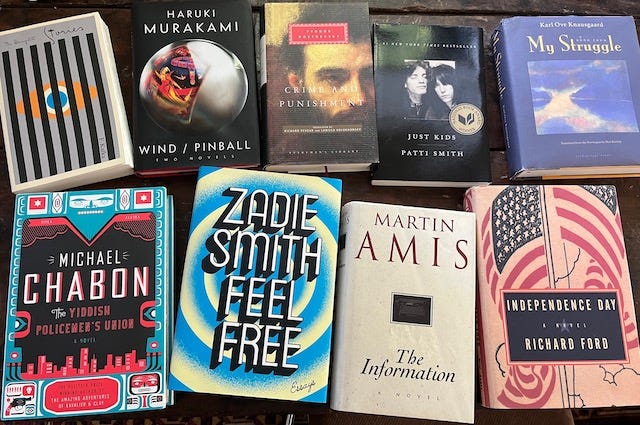10 Questions to Ask a Writer
Conversation is key....
LAST WEEK, I sent out a Substack column under the title “8 Questions Never to Ask a Writer.” In my preliminary thinking for the post, I always imagined it would include suggestions for what questions writers might welcome. Somehow, when it came to writing the piece, I forgot about the second half, which would have lent balance to the post and made it a lot more helpful. Instead, in my eagerness to get the column into your inboxes, once I finished the “not-to-asks” I hit send before reflecting on what was missing from the piece.
Thanks to one attentive reader who left a comment asking, “What questions would you like readers to ask you?”, I was reminded of my initial plan. And so, while it is a case of playing catch-up, herein I revisit the question of what to ask and not to ask writers about their work, offering suggestions for the former.
The one proviso I attach to all these suggestions is that they be asked only by questioners who are truly interested in hearing the answers, and by that I mean the complete answers. These questions should not be used to make small-talk or chit-chat. Nothing can be more deflating to a writer than thinking someone has a sincere interest in his work and looking forward to addressing it in a meaningful way with a correspondent, only to discover that it was a bait-and-switch maneuver to grab one’s attention and steer it elsewhere.
I do not think any writer would have a problem answering any of these questions:
1. What made you want to be a writer?
2. When did you know you wanted to be a writer?
3. How did you learn to write?
4. What books or magazines do you read regularly? Which ones would you recommend to aspiring writers?
5. Who are your favorite authors?
6. Where do you get your ideas from?
7. What is your favorite part of writing?
8. What is your favorite part of being a writer?
9. What is your least favorite part of writing?
10. What is your least favorite part of being a writer?
What I appreciate about all these questions is that they are open-ended. They can go in any and many different directions. Any single one of them can easily become the basis of a conversation. A curious writer – and most or all writers are, by definition, curious; it’s part of the job description – will want to engage beyond merely answering the question by turning it around and asking the appropriate analogous question of his interlocutor.
None of these questions come embedded with problematic attitudes or assumptions. None of them betray a preconceived notion of what a writer does, which typically delimit the extent to which the writer can seriously engage with the questioner. They do not impose upon or require a writer to talk about current work, while allowing for that possibility should the writer choose to steer the conversation in that direction.
Conversation is key. These questions all attempt to foster conversation: the exchange of thoughts and feelings. They betray no hint of aggression or passive-aggressiveness, in the way that the eight questions never to ask a writer all do. These questions come instilled with a sense of humanity, dignity, respect, empathy, warmth, and curiosity. We could all use a lot more of those qualities in our lives, in our environment, and in the greater social spheres we inhabit. There are lessons here that apply to all, writers or otherwise.
I hope that clarifies the matter.
Thanks for listening. Comments are open to all. I would love to hear from you.



Terrific post. Excellent questions. And fun!!